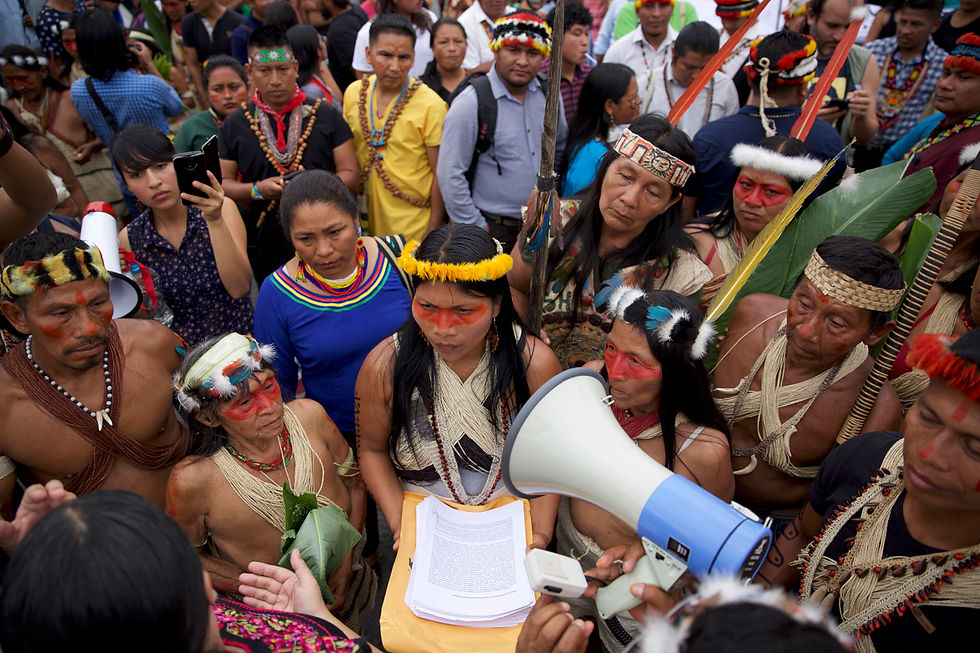Crime Against Prosperity: The Columbian Exchange
- Alberto Adelantado Calvo
- May 3, 2020
- 3 min read
‘There are marvellous pine groves and broad meadows, and there is honey and there are many different kinds of birds and many varieties of fruit.’
In February 1493, Columbus wrote for the first time a letter to the Queen and King of Spain telling them about what he had found on the other side of the Atlantic Ocean. His mention of the opulent and abundant natural resources does not go unnoticed and it is of great importance since it symbolises the beginning of what is known as ‘the Columbian Exchange’. The Columbian Exchange was the large-scale transfer of natural wealth between the Old World (Europe, Asia and Africa) and the New World (America). This included crops, animals, people and diseases. This exchange is however highly problematic.
The first problem: the way it is framed diminishes the fact that it was among the most efficient devices of colonialism. Secondly, its effects are still alive today in a way so present that many people don’t even imagine.
The Columbian Exchange set the basis of the success of colonialism in two ways: it eliminated a large part of the indigenous population and it replaced the original nations of America with a new European and a new African nation. To begin with, the exportation of typhus, pox and tuberculosis decimated the numbers of the American natives spanning from the Cahokian culture in the Mississippi basin to the Inka empire in the Andes.
Secondly, and what is the most blatant product of the Columbian exchange was the massive movement of people from the East side of the Atlantic to the West, in the form of migration and slave trade. The demographic vacuum was rapidly filled, and so was the cultural one. African and European Americans developed a distinct identity and started considering themselves the natives of a continent that a lost Genovese had stumbled upon in the search of spices, gold and silk.
The real natives meanwhile, had to cope with epidemics brought first by the Spaniards, followed by the Portuguese, English, French and Dutch. Moreover, the ecosystems in which they depended to survive were being destroyed by animals they had never seen. In Cuba, pigs ate the flora to the extent that the ground was no longer shielded from rain, leading to the erosion and infertility of the soil.

Image: Amazon Frontlines (The Waorani people win a lawsuit against the government to keep their land)
“Man kills faster than the pace of evolution”.
That is how historian Crosby explains the degree of destructiveness caused by the injection of life forms in America. Not only did the newcomers take possession of the land, yet they also changed what grew from it and claimed an ancestry that was not theirs but belonged to the people that were struggling to survive the violence, after the arrival of the white man and all his slaves.
Indigenous people have been robbed from their land, their resources, including the ancestral and spiritual attachment to the place they were born in. This results nowadays, in the total marginalisation of the indigenous culture and the total crippling of their opportunities to progress. They are seen as strangers, foreigners and aliens. The new countries formed above them don’t recognise native cultures as a part of the nation but are forced to interact with them since they have been accidentally trapped within the artificial borders, created by the new inhabitants of the continent. A problem all states have but don’t necessarily have to deal with.
Blame is so diffused, and the autonomy in which the first inhabitants have to speak up is so little that no one is held accountable, nor tires to genuinely solve the injustice under which these people live. The recognition of that injustice is key.
If it is not just, then it can be considered a crime against prosperity. Developing this notion is important because it sets the basis for further prosecution. The natives of the American continent have been robbed. Robbery is a crime. This robbery is not different from any other: they were robbed of the both human and natural means, that they needed to prosper and consequently, deserve justice.
Our future is being stolen due to the exploitation of the Earth’s natural resources; however, their future was already stolen when Columbus first mentioned the fruits of the New World in his letter to the Queen and King of Spain. Prosecution for crimes against prosperity could set a precedent for environmental justice for instance.
Declaring the Columbian Exchange as a crime against prosperity is imperative. By re-establishing to the native population the necessary means that they need to prosper again, it will be a recognition that it is illegitimate to rob someone’s future.
Edited by Ellie Muir

































